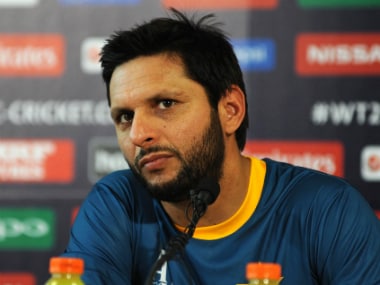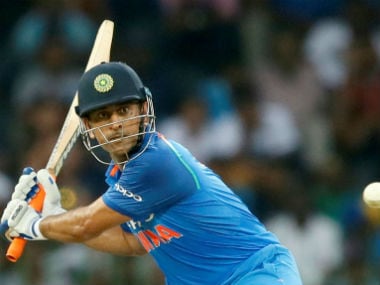Law Commission's game-changing suggestion to bring BCCI under RTI Act needs political will to become reality
The Law Commission’s suggestion to bring BCCI under RTI will remove the distinction that BCCI has deliberately and carefully built between itself and other National Sports Federations.
G Rajaraman, April 19, 2018
T20 LEAGUE POINTS TABLE
| Pos. | Team | P | W | L | D | Pts. |
|---|---|---|---|---|---|---|
| 1 | Kolkata |
5 | 3 | 2 | 0 | 6 |
| 2 | Hyderabad |
3 | 3 | 0 | 0 | 6 |
| 3 | Punjab |
3 | 2 | 1 | 0 | 4 |
| 4 | Chennai |
3 | 2 | 1 | 0 | 4 |
| 5 | Rajasthan |
4 | 2 | 2 | 0 | 4 |
| 6 | Mumbai |
4 | 1 | 3 | 0 | 2 |
| 7 | Bangalore |
4 | 1 | 3 | 0 | 2 |
| 8 | Delhi |
4 | 1 | 3 | 0 | 2 |
- New Zealand Women in Ireland, Only T20I, 2018 IREW vs NZW - Jun 6th, 2018, 04:30 PM IST
- New Zealand Women in Ireland, 3 ODI Series, 2018 IREW vs NZW - Jun 8th, 2018, 03:00 PM IST
- South Africa Women in England, 3 ODI series, 2018 ENGW vs SAW - Jun 9th, 2018, 03:30 PM IST
- New Zealand Women in Ireland, 3 ODI Series, 2018 IREW vs NZW - Jun 10th, 2018, 03:00 PM IST
- South Africa Women in England, 3 ODI series, 2018 ENGW vs SAW - Jun 12th, 2018, 05:30 PM IST
- New Zealand Women in Ireland, 3 ODI Series, 2018 IREW vs NZW - Jun 13th, 2018, 03:00 PM IST
- South Africa Women in England, 3 ODI series, 2018 ENGW vs SAW - Jun 15th, 2018, 06:30 PM IST
- Womens T20I Tri-Series in England, 2018 SAW vs NZW - Jun 20th, 2018, 05:30 PM IST
- Womens T20I Tri-Series in England, 2018 ENGW vs SAW - Jun 20th, 2018, 10:10 PM IST
- Womens T20I Tri-Series in England, 2018 ENGW vs SAW - Jun 23rd, 2018, 05:30 PM IST
| Rank | Team | Points | Rating |
|---|---|---|---|
| 1 | India | 5313 | 121 |
| 2 | South Africa | 5154 | 117 |
| 3 | New Zealand | 3886 | 102 |
| 4 | Australia | 4599 | 102 |
| 5 | England | 5029 | 97 |
| 6 | Sri Lanka | 4374 | 95 |
| Rank | Team | Points | Rating |
|---|---|---|---|
| 1 | India | 7594 | 122 |
| 2 | South Africa | 6911 | 117 |
| 3 | England | 7496 | 117 |
| 4 | New Zealand | 7081 | 114 |
| 5 | Australia | 6376 | 112 |
| 6 | Pakistan | 4877 | 96 |
| Rank | Team | Points | Rating |
|---|---|---|---|
| 1 | Pakistan | 3763 | 130 |
| 2 | Australia | 2513 | 126 |
| 3 | India | 4341 | 124 |
| 4 | New Zealand | 3013 | 116 |
| 5 | England | 2402 | 114 |
| 6 | South Africa | 2551 | 111 |





It would be too early to break into celebrations but, in a welcome move, the Law Commission of India has proposed that the Board of Control for Cricket in India (BCCI) be brought under the purview of the landmark Right to Information Act 2005 since the Board exercises powers as an agency or instrumentality of State.
The Law Commission’s suggestion will remove the distinction that BCCI has deliberately and carefully built between itself and other National Sports Federations. If the Ministry of Law and Justice and the Ministry of Youth Affairs and Sports notify the BCCI that it should conform to the RTI Act 2005, the Board may change much of its functioning.
Representational image. AFP
There would be greater transparency in the functioning of the Board’s administration if an element of fear of greater public scrutiny in a variety of areas — not including confidential information on athletes — if the Law Commission’s Report No 275 — Legal Framework: BCCI vis-à-vis Right to Information Act 2005 is accepted in toto and implemented.
It does not take much to decipher that the ‘if’ in the previous paragraph is a big one. For, it needs huge political will for this to become a reality. Over the past few years, it has been seen that the Board’s clout in the political circles has been quite significant and cuts across party lines. Cricket is one place where the political affiliations take the backseat.
It will, therefore, be interesting to see how the Ministry of Law reacts to the Law Commission’s suggestion. Will it notify the Board of Control for Cricket in India and its affiliated units that they will henceforth be amenable to the Right to Information Act 2005 or will it let the pages of the report gain a sepia tint before taking up the suggestions.
It cannot be forgotten how the then Minister for Youth Affairs and Sports Ajay Maken was told by the Cabinet to review the draft National Sports Development Bill 2011. Newspaper reports of the time suggested that it was the then Minister of Finance Pranab Mukherjee who led the argument against the draft Bill. Other Ministers, Sharad Pawar and Praful Patel, also fiercely opposed it.
Around the same time, the Ministry of Youth Affairs and Sports told the Central Information Commission that since the BCCI performs functions akin to the State and public duties by selecting national teams and representing India in international events just and reasonable grounds existed for BCCI to be declared a public authority under the Act.
In 2017, the Central Information Commissioner Prof M Sridhar Acharyulu, said the BCCI to be a public authority but directed the Prime Minister’s Office, Ministry of Law and Justice and the Ministry of Youth Affairs and Sports to explain their stand on why they had not taken any measures to implement its declaration that BCCI is a public authority under the Act.
Despite the Ministry of Youth Affairs and Sports stating that grounds existed for BCCI to be brought under the purview of the RTI Act 2005, it never went ahead and notified the Board to implement the provisions of the Act. Similarly, not much has been heard of action on this directive of the Central Information Commissioner either.
Viewed against such a backdrop, the Law Commission’s Report presented on Wednesday to the Minister for Law and Justice, Ravi Shankar Prasad, can only be seen as a significant step. Whether it will lead to a Government Order declaring BCCI as an agency or instrumentality of State, making the RTI Act 2005 applicable to it and all its constituent member associations, remains to be seen.
It is significant to note that the Board of Control for Cricket in India did not participate in the consultative process of the Law Commission, ignoring the notice and reminders. For a body that spent close to Rs 50 crore on legal and professional charges in two financial years 2014-16 as per its annual report, it is strange that it did not depute its legal teams to present its point of view.
There are two possible reasons for BCCI to leave the issue unattended. First, it must be quite confident that it can impress upon the political leadership not to act on the recommendations of the Law Commission. Given that the Supreme Court-appointed Committee of Administrators, now functioning at half strength, would not have wanted to oppose the move.
Be it the arrogance of the old hands or the ignorance of the new power centre, it does not augur well that BCCI chose to ignore the notice of the Law Commission. It was perhaps akin to the All India Muslim Personal Law Board boycotting the Commission’s questionnaire on Uniform Civil Code.
There have been instances of the Commission’s recommendations drawing mixed responses. Its August 2015 suggestion on abolishing the death penalty, except in terror related cases, was rejected by many States. The Bar Council of India rejected the Commission’s report on regulation of the legal profession.
So, while the Law Commission’s Report No 275 is interesting in itself, only time will tell if cricket leadership swings into action to try and stall it. It will be worth the wait to see if India's political leadership decides to go ahead with a game-changing suggestion.
Updated Date:Apr 19, 2018
Also See
Law Commission of India recommends Centre to make BCCI a 'state' body, bring it under Right to Information Act
Sourav Ganguly-led BCCI panel recommends inclusion of Bihar, northeastern states in Ranji Trophy 2018-19
BCCI media rights e-auction: Rs 6,138 crore deal will help board develop cricket infrastructure, take sport to unexplored areas